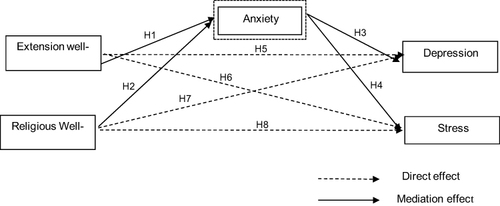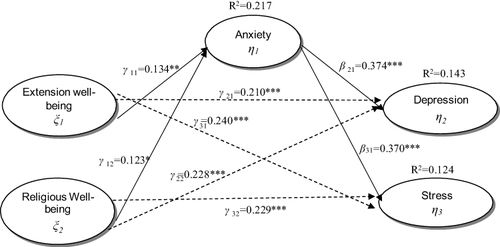Figures & data
Table 1 Participants Demographics
Figure 1 Proposed research model by authors how spirituality can reduce the anxiety that leads to stress and depression in Muslim communities during the COVID-19 pandemic. People suffering from high anxiety cannot control their emotions, which leads to high stress and depression.Citation36 Therefore, spirituality is a self-approach to God, the environment, and society that can control anxiety so that it does not lead to stress and highs.Citation3,Citation48 The current study found that the results of the intervention conducted at that time were not effective in reducing anxiety because it was conducted online between the patient and the therapist.Citation13 During the pandemic in Indonesia, we examined the relationship between mental disorders and spirituality in coping with the pandemic through anxiety. The higher the spirituality, the lower the anxiety (fear, worry, and panic).

Table 2 Measurement Results
Table 3 Correlation Matrix for Measurement Scales
Table 4 Proposed Model Results
Figure 2 Structure result model, predictor variables of spiritual well-being (religious and external well being) have indirect and direct effect on people's depression and stress through anxiety. the score indirect effect of extension well-being and religious well-being on anxiety as a moderator are γ11 = 0.134, γ12 = 0.123; p < 0.01; p < 0.05. This value indicates a significant effect of extension and religious well-being on anxiety. in addition, the anxiety as a mediator has significant effect on depression and stress with values β21= 0.347 and β31= 0.370; p < 0.01. It is indicating that low anxiety can reduce depression and stress. On the other hand, the direct effect of extended well-being on depression and stress is γ21 = 0.210*** and γ31 = 0.240*** with p < 0.001, indicating that the extent of well-being positively affects depression and stress. In addition, the direct effect of religious well-being on depression and stress had a positive effect on depression and stress with a value of γ22 = 0.228*** and γ32 = 0.229***; p < 0.001. This study found R square anxiety (R2 = 0.217), depression (R2 = 0.143), and stress (R2 = 0.124). Therefore, this study states that spiritual well-being can control and reduce anxiety to prevent depression and stress.

Table 5 Mediation Effects
